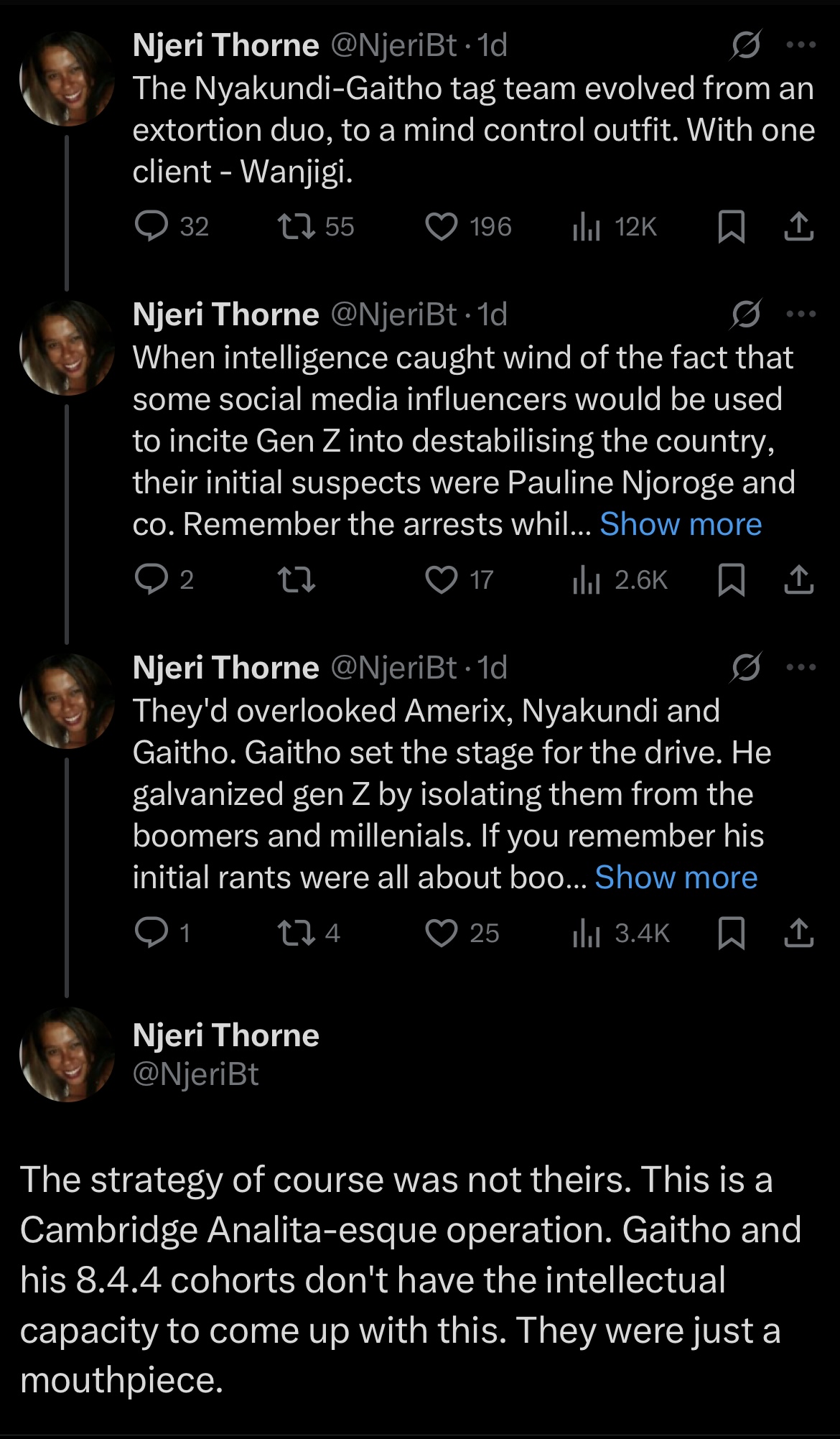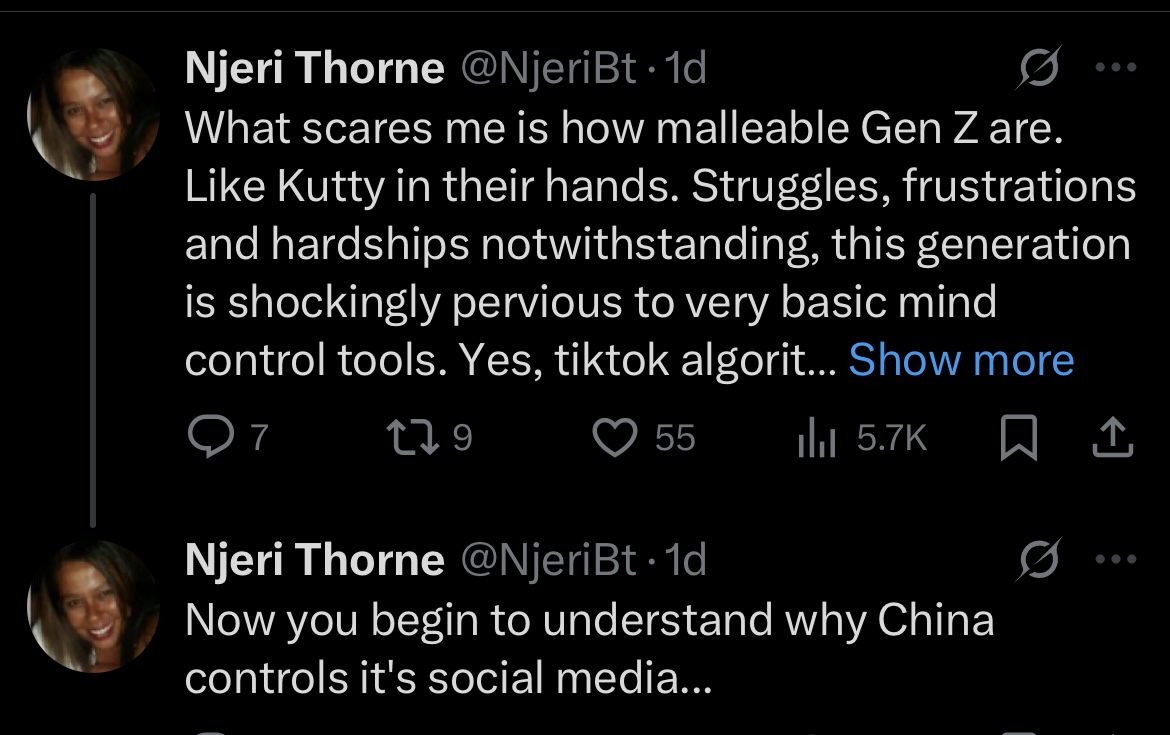The Psychology of Fear and Falsehoods: Analyzing a Targeted Disinformation Campaign
A series of tweets by Njeri Thorne has sparked attention for their provocative claims about individuals such as Francis Gaitho, Cyprian Nyakundi, and Amerix. These posts suggest a coordinated effort to manipulate public perception, particularly targeting Generation Z, through a blend of fearmongering and misinformation.
This article examines the psychological tactics at play and draws parallels with historical examples where similar strategies have been employed to influence societies.
Oh, how the mighty have stumbled! Njeri Thorne and David Ndii, those self-appointed maestros of state-sponsored propaganda, are now wringing their hands in theatrical despair as the narrative slips through their well-manicured fingers.
These brilliant minds, who once wielded psychological operations straight out of the Cambridge Analytica playbook to prop up the catastrophic and downright demonic presidencies of Uhuru Kenyatta and William Ruto, are suddenly aghast that their tired old tricks have been outclassed.
It’s almost endearing to watch them cry over the sophisticated evolution of communication oh, the horror of a public thats learned to see through their lies and build its own narrative!
And here we are, witnessing the irony of it all: the architects of government spin, who turned manipulation into an art form, are now clutching their pearls as the digital age leaves them in the dust.
As the Ruto regime teeters toward collapse, their desperate smear campaigns are less a strategic counterattack and more a tantrum from toddlers who’ve lost their toys. Bravo, Njeri and David, for proving that even the best psyops can’t outrun a public thats finally wised up to your demonic little game.
Unmasking the Drama: Njeri Thorne’s Child Support Extortion Antics
Njeri Thorne, a communications consultant, has publicly accused Cyprian Nyakundi and Francis Gaitho of engaging in extortion, while she herself has been implicated in a similar controversy involving her baby daddy, Wambembe Sitati.

EXTORTIONIST: Njeri Thorne uses social media to extort her baby daddies
Njeri used social media to expose Sitati for failing to pay child support, sharing purported screenshots of their email conversations to support her claims. Following the public backlash, Sitati reportedly sent her KSh 150,000, after which Njeri celebrated her success on the X platform.
However, the narrative takes a twist with allegations that Njeri has a history of soliciting child support through social media and had previously approached Cyprian Nyakundi to publicize her case, a decision he now regrets.
Njeri is the true extortionist in this scenario, leveraging public platforms to pressure individuals into financial support.
Amplifying Fear through Exaggeration
Njeri Thorne’s narrative begins with the assertion that the “Nyakundi-Gaitho team” has evolved from an extortion duo into a “mind control outfit” with a single enigmatic “client – Wanjigi”
This hyperbolic escalation is a deliberate tactic to instill widespread fear, portraying these individuals as threats not only to individuals but to national stability.

Betty Njeri Thorne: State-sponsored propagandist throwing tantrums that she’s been beaten at her own game
By linking their supposed actions to the manipulation of Gen Z-a demographic often perceived as impressionable – this strategy taps into societal anxieties about generational divides and the unchecked power of social media.
The cryptic mention of a client heightens the intrigue, suggesting a shadowy force at work.
Scapegoating and False Attribution
Further tweets allege that intelligence uncovered a plot involving social media influencers, initially suspecting Pauline Njoroge and others, before shifting focus to Nyakundi, Gaitho, and Amerix. Thorne claims Gaitho “galvanized Gen Z by isolating them from boomers and millennials,” with his early rants allegedly laying the groundwork for this division.
This scapegoating tactic falsely attributes a coordinated destabilization effort to these figures, devoid of evidence. Such a narrative is designed to vilify them, fostering outrage and a sense of betrayal among different age groups, a classic move in psychological manipulation.
Association with a Sophisticated Conspiracy
The tweets escalate by labeling the operation “Cambridge Analytica-esque,” implying that Nyakundi, Gaitho, and Amerix are mere mouthpieces in a grand, intellectually orchestrated scheme beyond their capabilities.
 This tactic leverages the notoriety of the Cambridge Analytica scandal – where data analytics were used to influence the 2016 U.S. presidential election and the Brexit referendum – to suggest a level of sophistication and danger.
This tactic leverages the notoriety of the Cambridge Analytica scandal – where data analytics were used to influence the 2016 U.S. presidential election and the Brexit referendum – to suggest a level of sophistication and danger.
By presenting these individuals as puppets in a larger plot, the narrative encourages fear and suspicion, even as it lacks substantiation.
Exploitation of Generational Vulnerability
Thorne’s additional posts express alarm at the “malleability of Gen Z,” likening them to “Kutty in their hands” and highlighting their susceptibility to “basic mind control tools” like TikTok algorithms.
This framing positions Nyakundi, Gaitho, and Amerix as exploiters of this vulnerability, reinforcing the fear narrative.
The subsequent reference to China’s control over social media subtly suggests a global parallel, implying that their actions could necessitate similar authoritarian measures, thus amplifying the stakes.
Creating a Self-Reinforcing Narrative
The cumulative effect of Thorne’s tweets builds a self-sustaining cycle of suspicion. Starting with the evolution from extortion to mind control, moving to influencer involvement, and culminating in a sophisticated operation comparison, the narrative encourages readers to connect the dots themselves This psychological tactic keeps the audience engaged, deepening the impact of the falsehoods by fostering a sense of urgency and mistrust.
This psychological tactic keeps the audience engaged, deepening the impact of the falsehoods by fostering a sense of urgency and mistrust.
Historical Parallels
This strategy mirrors tactics used in past disinformation campaigns:
- Cambridge Analytica (2016-2018): The firm exploited social media data to target voters with tailored misinformation, amplifying fears about immigration and economic instability. Like Thorne’s tweets, it relied on exaggerated narratives to influence behavior, as detailed in investigations by The Guardian and The New York Times.
- Soviet Disinformation Campaigns (Cold War Era): The KGB spread false narratives, such as the “AIDS as a U.S. bioweapon” story in the 1980s, to sow fear and distrust. Documented by the U.S. State Department, these campaigns used scapegoating and conspiracy theories, akin to the vilification of Nyakundi, Gaitho, and Amerix.
- Rwandan Radio Propaganda (1994): During the Rwandan Genocide, Radio Télévision Libre des Mille Collines broadcast exaggerated claims to incite fear and hatred against the Tutsi population, leading to mass violence. The isolation tactic employed by Thorne echoes this divisive strategy.
The Unraveling of David Ndii: A Desperate Grasp at a Lost Narrative
The political landscape in Kenya is witnessing a dramatic shift, with David Ndii and his allies appearing to stumble in their efforts to maintain control over the public narrative. Once a commanding voice, Ndii now finds himself cornered, his credibility waning as the William Ruto regime teeters on the brink of collapse.

The recent flurry of smear campaigns and pointed accusations against figures like Francis Gaitho, Cyprian Nyakundi, and Amerix paints a picture of desperation; a last-ditch effort by Ndii and his cohort to salvage a failing agenda.
The irony is stark. Ndii, who has long been accused of employing the very tactics he now condemns, seems to be hoist with his own petard.
His X post from February 7, 2024, recommending Christopher Wylie’s Mindfck* – a book detailing Cambridge Analytica’s manipulative strategies – suggested a sophisticated understanding of narrative control.
Yet, fast forward to today, and that same sophistication appears to have deserted him.
The recommendation, once a subtle flex of intellectual prowess, now reads like a hollow echo of a strategy gone awry.
Adding fuel to the fire is Njeri Thorne’s reply, where, she dismisses Gaitho and his allies as intellectual lightweights, incapable of devising the strategies they’re being blamed for, and labels them mere mouthpieces.
While intended as a jab, her words inadvertently underscore the chaos within Ndii’s camp. If Gaitho and company lack the capacity to orchestrate such a narrative, who does? The finger-pointing only deepens the impression of a fractured alliance clutching at straws.

THE END OF AN ERA: David Ndii, the genius credited with concocting the “bottom up” electoral sham, is in a state of denial that he no longer controls the narrative
Ndii’s smear campaign against government critics can be seen as nothing short of an unofficial surrender. With the Ruto regime facing an impending rapture, the once-confident strategist appears to have lost his footing.
The narrative has slipped from his grasp, and his attempts to regain it through mudslinging only highlight his failure.
As public discourse shifts and new voices rise, Ndii’s legacy risks being defined not by his past influence, but by this moment of floundering defeat. In the end, it seems the master of the game has become a pawn in a story he can no longer control.
Conclusion
The psychological tactics in Njeri Thorne’s tweets-fearmongering, scapegoating, and the fabrication of a sophisticated conspiracy-aim to discredit Francis Gaitho, Cyprian Nyakundi, and Amerix by portraying them as central figures in a baseless plot to destabilize society through Gen Z manipulation.
Drawing on historical examples like Cambridge Analytica, Soviet disinformation, and Rwandan propaganda, it’s clear these methods are not new but are being adapted to the digital age.
Without evidence, this campaign appears more propagandistic than factual, highlighting the need for critical scrutiny of such narratives in today’s information landscape.

